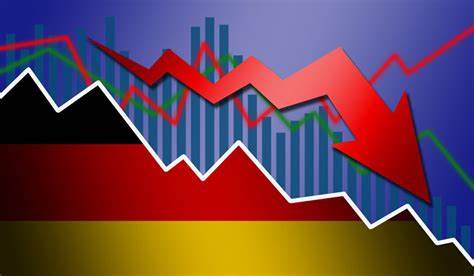Germany falling into a recession as the consumers in Europe’s biggest economy spend less and demand more.
Germany Could be next in what is becoming a European Recession.


Germany has slipped into recession as last year’s energy price shock takes its toll on consumer spending. Output in Europe’s largest economy dropped 0.3% in the first three months of the year, following a 0.5% contraction at the end of 2022, official data showed Thursday. The Federal Statistical Office downgraded its previous estimate of zero growth in gross domestic product (GDP) compared with the previous quarter. A recession is defined as two consecutive quarters of declining output which results in a decline of currency and GDP.
European energy prices were already rising when Russia’s invasion of Ukraine in February last year sent them soaring to record highs. Moscow then went on to throttle gas supplies to European countries, prompting Germany to declare an emergency. Natural gas prices have since tumbled and now stand at levels last seen in late 2021, pointing to easing inflationary pressures on consumers’ pockets. The annual rate of inflation in Germany slowed again in April, the first month of the second quarter, although, at 7.2%, it remained high.
In a sign that Germany’s recession may prove short-lived, timelier survey data showed earlier this week that business activity in the country expanded again in May, despite a sharp downturn in manufacturing. German Chancellor Olaf Scholz described the outlook for the economy as “very good”, pointing to measures his government has taken in recent months to expand renewable energy production and attract foreign workers.
However, Franziska Palmas, Senior Europe economist at Capital Economics, forecast that German output would shrink again in the third and fourth quarters. Writing in a note, she said higher interest rates, needed to tame inflation, would continue to weigh on both consumption and investment, and Germany’s exports might also suffer as demand was sapped by weakness in other developed economies.
China is Germany’s most important trading partner, just ahead of the United States. Exports of German cars to China fell 24% in the first quarter. Germany’s recession around the turn of the year looks to have been relatively shallow, defying much gloomier predictions by its top economic forecasters. A report by five German economic institutes in April 2022 said the country’s GDP would contract by 2.2% in 2023 if its supply of Russian natural gas was suddenly shut off.
The German economy is expected to shrink by 0.1% in 2023, according to the latest forecast from the International Monetary Fund. In August, Russia closed its Nord Stream 1 pipeline, Germany’s main source of Russian gas, for maintenance and then extended the closure indefinitely. This will surely add to concerns that the recession may not be so short lived after all.

 বাংলা
বাংলা  Spanish
Spanish  Arabic
Arabic  French
French  Chinese
Chinese 
